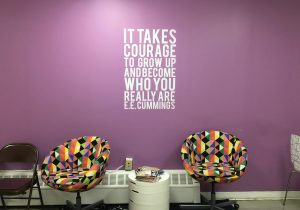As I walk up the stairs from the 4 Train toward 170th Street, I’m immediately surrounded by noise. A block or two away, I hear a jackhammer. Along the sidewalk is a line of speakers, all blaring different music from different stores to tempt customers with their sales inside. People are laughing, chatting, slowly pulling grocery carts, or hustling for the bus. Continuing downhill, the cacophony and energy build as I pass pizza places, barber shops, liquor stores, and bodegas. Crossing over an unannounced threshold, I begin walking by self storage rental units, auto parts stores, abandoned lots, and the jackhammer fades to an echo. Within a few blocks, I am passing houses and apartment buildings with steel bars protecting the windows, and I ring the bell under door #3. After the security cameras are checked, I’m buzzed into the offices of Highbridge Voices.
Highbridge Voices is a rigorous after-school music and academic program for children, ages 9-18, living or going to school in the Highbridge neighborhood of the South Bronx. On this particular visit, it’s 2:30 pm on Friday, February 16, 2018, just half an hour before the doors open for the kids, so I walk in the building to a flurry of staff preparations. I sign a visitor log and fill out a name tag (a safety precaution to track who enters and exits the building in addition to the locked doors and security cameras), as the conductor and pianist make their way toward the rehearsal space. Teachers are getting classrooms ready, and the program aide is preparing a spreadsheet to record students’ grades for the week. Fridays are report card days, and the kids are rewarded if they bring in their latest progress update from school.

I sit, attempting to stay out of the way of the preparations in order to get myself equally ready. I’m seated in a classroom in front of a purple wall with the painted words of E.E. Cummings: “It takes courage to grow up and become who you really are.” Organizing my equipment, making sure that my pencils are sharp for jotting down notes, I start chatting with the Program Coordinator, Nikita Turnbull. I haven’t seen Nikita in years, so she catches me up on her new position (she has worked her way up the organization after graduating from the program), and I catch her up on my plunge back into academia (she’s only ever known me as a folk singer). We both laugh at the idea that I have homework again after many years.
I first met Nikita, and first learned about Highbridge Voices (HBV), when my college roommate, Mary Clementi, started working for the organization as the Associate Music Director in 2010. I originally attended the benefit concerts, or made donations to support my friend. This morphed into supporting a mission, as I learned about the organization’s success and effectiveness in working with children. Listed on their website and literature, HBV’s official mission statement is: “Inspiring excellence in the lives of the children of the Highbridge community through their participation in music.” Speaking from a purely musical standpoint—as a former music student who studied in multiple private and public environments, a current music teacher, touring folk singer, and graduate student studying Music and Human Rights—in my musical opinion, this program is exceptional. The kids are talented, challenged, supported, and well-trained; in fact, I even hired them to perform on my latest album.
When presented with an opportunity to study a musical community this semester, I was excited for the chance to spend time at HBV. Though I had been to performances, and worked with the kids in the studio, I’d never been to their space. I’d never seen them rehearse, or even been in their neighborhood. Now the Executive and Music Director of HBV, Mary was incredibly generous with her time, and allowed me access to all aspects of the program to better understand this community. This website and accompanying paper are the results of interviews, my observations, videos, and recordings made during my many visiting sessions. I do my best to share the essence of HBV, explain the benefits of a rigorous music education program for youth in a low-income, high-crime community, and pose questions about the effects of trauma on the body and the voice.